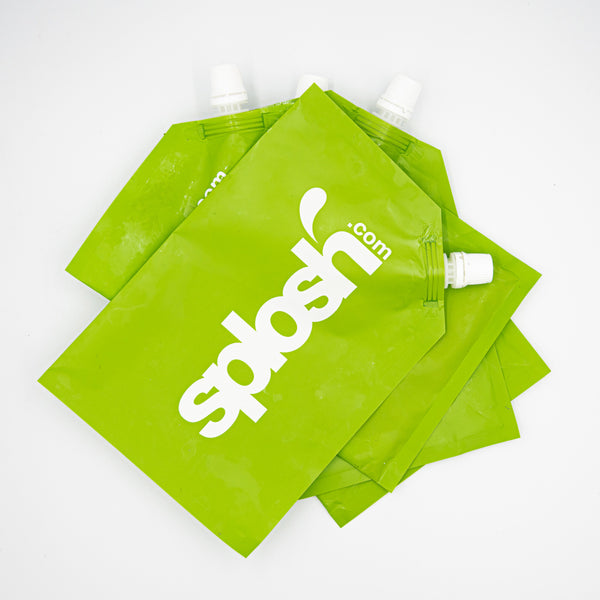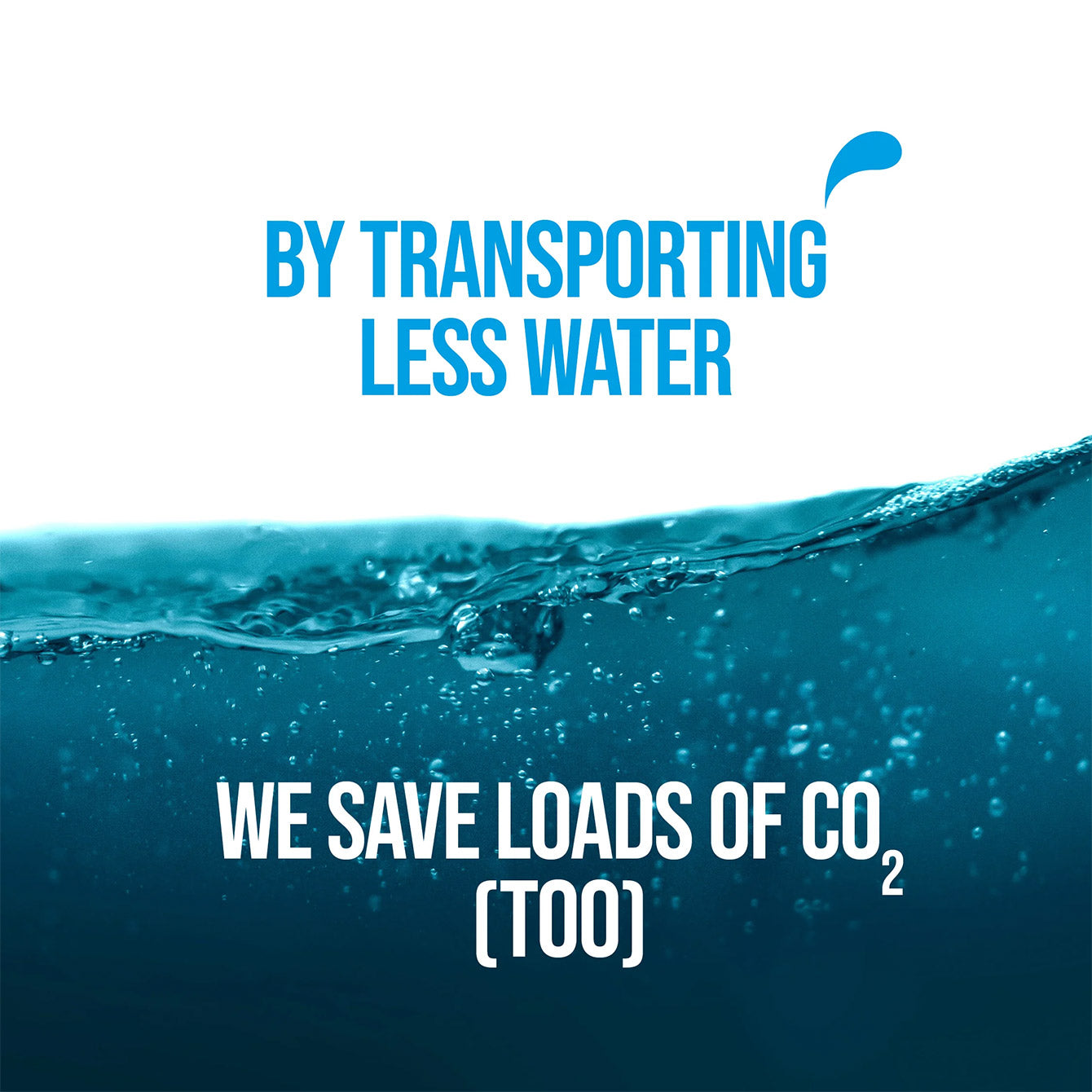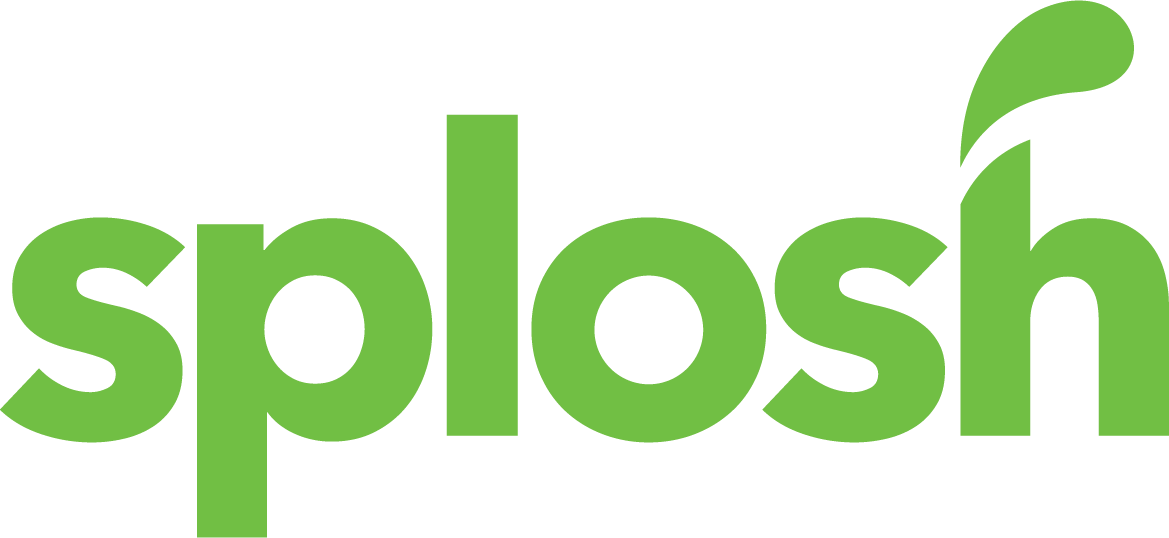Our refills come as concentrates in pouches
The combined effect of concentration and using pouches reduces plastic by around 90%.
Splosh pouches weigh about 70% less than bottles and dispensers. That means 70% less plastic waste.
Splosh products are delivered as concentrates, then diluted at home with tap water. They’re around three or four times more concentrated than comparable products in supermarkets, which mean they need three or four times less plastic packaging. Combine the low pouch weight with the product concentration and you have 90% less plastic waste.
And that’s great – but how do we hit the zero waste mark?
We re-use or reprocess our pouches into new products
You can send your used refill pouches back to us. If possible, we re-use the pouches. They are cleaned, sanitised and refilled and sold as Crinkly pouches. Crinklies come at a 10p discount and are not available on subscription – please note that availability will vary.
If we can’t refill pouches we reprocess them. Normally, pouches can’t be recycled so they end up as waste. But if they’re collected in large volumes of identical packaging, they can be reprocessed. That’s our trick. We make them into plastic ply boards that are used in the UK building trade. These boards are much more durable than their wooden equivalents and - best of all - they can be re-made into new boards at the end of their life.
We’ve created what’s known as a ‘closed loop recycling system’. This means we control the material throughout its life, so we know exactly what’s going in the recycling mix. When the new products reach their end of their life, we’ll even be able to reprocess them – so zero plastic goes to waste. This may sound a little nerdy, but we think this is a great example of the circular economy in action!

Since we launched 9 years ago we’ve experimented with many different refilling systems – from water-soluble sachets to dissolving powders. We’ve concluded that refilling with pouches combines the best product performance with the least amount of waste.
Together we have saved almost 2.5 million bottles from bins!
Get StartedThe trouble with recycling
When we recycle, we’re doing our bit for the planet, right?
Unfortunately, it’s not that simple.
Recent figures show that around 40% of disposed household bottles in the UK are collected for recycling. But because of ‘taint’ (the residue left from home and personal care products), only bottles containing drinks can be recycled into other bottles. So your washing up liquid bottle gets turned into something like a fleece or a road traffic cone. That’s not recycling – it’s ‘down-cycling’. And when this new product comes to the end of its life? It can be downcycled no further and ends up in landfill.
The sad fact is that almost every plastic home cleaning and laundry bottle ultimately goes to landfill. And that’s not what you’re picturing when you see that neat little recycling logo, is it?

Why buy weighty water?
Look at the ingredients printed on the back of any liquid home product. The first named ingredient is water (or ‘aqua’). It’s typically between 70 and 95% of the whole formulation. In other words, you’re buying mainly water.
A high water content makes sense for both manufacturers and retailers. Because water has a low cost, it bulks out the product and helps to increase margins. The only extra cost is in transporting it around the country. But because supermarkets have such efficient distribution networks, that’s not an issue for them.
The simple truth is that the water in those bottles could just as easily come out of your tap at home. And if it does come out of your tap – which is the Splosh way of doing things – you’re doing environment a big favour.
The Great Pacific Garbage Patch is a mass of plastic waste that has accumulated in the Pacific Ocean. It is estimated to be twice the size of Texas – or three times the size of France.
Four fifths of marine debris is estimated to have been blown or washed from land. To put it another way, this ecological disaster is our responsibility.
It was once thought that plastic in our seas, though ugly, wasn’t an environmental crisis beyond being ingested by sea life. (In our minds, that’s crisis enough). Everyone assumed it wouldn’t break down and therefore wouldn’t enter the food chain.
But new research shows that plastic does break down, releasing dangerous substances into the food chain – and into humans. Our reckless disposal of waste is coming back to haunt us.
We need a radical new solution – and at Splosh, we’ve found it. If everyone in the UK switched to Splosh, we’d throw away around 1 billion less plastic bottles a year.

We know too much to carry on the way we are...
Fulmars are grey and white sea birds related to albatrosses. Over the last two years, a team at the Alterra Marine Laboratory has analysed 560 fulmars from eight countries. Their stomachs have contained an average of 44 plastic scraps. One fulmar found in Belgium contained 1603 bits of plastic. No wonder one scientist has sadly referred to them as ‘flying dustbins’.
Do good and feel good

vegan friendly
Splosh is vegan-friendly, septic tank safe and we NEVER test our products or ingredients on animals.

all natural
Our products are as natural as we can make them, so they’re kind to the environment and gentle on your skin.

great value
Splosh is great value because we cut out the middleman and deliver direct to you from our base in Wales.

our guarantee
If you don’t love Splosh, tell us within 14 days of your purchase and we’ll give you your money back.

strong design
Splosh bottles have printed designs and are very strong - so they should last for many years.

spread the love
Do tell your friends about Splosh - they'll love our great performing, zero plastic waste products.




